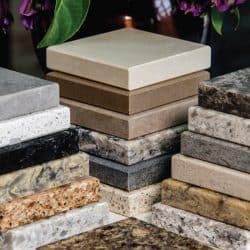Granite countertops are top-quality in both aesthetics and utility. Granite is available in many color variations, making it a breeze to find the right color for your home. You love the look and feel of granite countertops, but are they heat-resistant? We did the research so you won't have to.
Granite is one of the most heat-resistant countertop materials on the market. It can withstand temperatures up to 480 degrees; however, it is still not recommended to place hot pots and pans directly on the countertop without a trivet. The sealant used to protect granite countertops is not quite as durable as the granite itself.
Granite is a wonderful choice for your countertop; it's durable, beautiful, and can handle intense heat. Granite has many more features that can be useful in the kitchen as well. Keep reading to learn more about granite countertops and why they may be right for you.

Granite Can Handle The Heat
When it comes to hot pots and pans, the granite can handle the heat. As a naturally occurring material, granite can withstand high heat. However, the sealant protecting your countertops cannot handle the same levels of heat.
Granite is porous, meaning it can absorb liquids, so sealing it protects the stone from discoloration and bacteria formation. The sealants also help to protect the stone surface from scuffs and scratches due to wear and tear. If you set a hot pan on the counter and it compromises the sealant, that area becomes susceptible to damage.
What Makes Granite So Durable?
Granite is an igneous rock that forms when lava or magma cools and solidifies. The extreme temperatures that create granite are what make it incredibly heat resistant. Granite is made up of several different minerals including, but not limited to: quartz, feldspar, mica, and lime. It is mined from quarries in large blocks, then cut into smaller pieces that can be used for things like countertops. After the granite is cut to a manageable size, it is run through machines that polish the stone to provide a gorgeous shine.
What Temperature Can Granite Withstand?
Granite can safely handle around 480° Fahrenheit, but could likely withstand temperatures as high as 1,200° Fahrenheit. While temperatures this high will not damage the integrity of the stone, it can cause burn marks or damage your sealant, leaving you open for further damage and stains. Granite is not damaged by cold temperatures alone, but if it is exposed to extreme heat and followed with extreme cold, you could risk cracking.
Does Heat Crack Granite?
Heat can crack granite, although it is rare for temperatures to get high enough to accomplish this. Temperatures exceeding 1,200° Fahrenheit would probably be enough to crack granite. It is also possible to crack granite by exposing it to extreme heat then extreme cold. This causes the molecules that make up the stone to expand and contract very quickly and it could result in cracks.
Rest assured though, your granite countertops are very durable and it's very unlikely that they'll acquire any heat-induced cracking.
Can You Put Hot Pots On Granite Countertops?
It is not recommended to place hot pots directly on your granite countertop. While you may not see any immediate damage, it can cause future issues. Over time, you may see burn marks and it will weaken your sealant, allowing a way for stains to seep into the porous stone. It is strongly recommended to continue using trivets on granite surfaces to protect your investment and keep your granite looking immaculate.
What Causes Damage To Granite?
Refrain from using harsh chemical cleaners on your granite countertops like bleach or ammonia as this can wear down the sealant. Acidic substances can also wreak havoc on your sealant. Avoid using lemon juice, vinegar, or other acidic liquids.
Regular dish soap or cleaners specifically formulated for granite are the best option for cleaning your countertops.
Can Granite Crack?
In extremely hot or cold temperatures, granite does become more fragile. It's very unlikely that anything happening in your kitchen will cause temperatures this extreme; however, if this does happen, it's possible for granite to crack. Depending on the severity of the damage, it may be possible to repair it yourself using an epoxy repair kit specifically designed for granite.
Epox-Sci Instant Install Epoxy
This epoxy kit easily reattaches chipped or missing stone and seamlessly fills gouges or splits. In just under 30 minutes, you can have a completely repaired countertop.
Click here to see more on Amazon.
What Causes Discoloration In Granite?
Granite discoloration can be caused by a number of things. Food, drinks, heat, mold, and even sunlight can cause discoloration. Most organic stains caused by food and mold can be remedied with the right products and some elbow grease. These stains are usually absorbed into the porous stone once the sealant begins to deteriorate.
If your counter becomes sun-bleached, there is no way to reverse it. The only thing to do is invest in good blinds or sun-blocking curtains to prevent further damage.
The best way to fight discoloration in your granite is by taking preventative measures. Whenever something spills, take quick action to wipe up the mess. Staying on top of the sealing schedule also reduces the likelihood of discoloration. Cleaning should be routine as well; mild cleaners are ideal for the material.
Does Granite Come Sealed?
When you have your countertops professionally installed, the installation company will usually apply the sealant for you. Since granite comes as a completely organic material, it needs to be sealed. Sealant should be re-applied every 3-5 years, depending on how busy your kitchen is. Keeping your granite properly sealed will allow your granite countertops to last for generations while still maintaining their original luster.
There are some great products on the market that make it easy for a homeowner to do it themselves without the need to hire professionals.
Granite Gold Sealer Wipes
Click here to see more on Amazon.
Trinova Granite Sealer & Protectant
Click here to see more on Amazon.
How To Remove Heat Marks In Granite
If you have a burn on your countertop, you can try a do-it-yourself method first. You may want to test this method on a small, inconspicuous area first, to ensure you won't bleach your surface. Follow these simple steps:
- Make a thick paste of flour and hydrogen peroxide.
- Next, spread the paste on the affected area one-quarter inch thick and cover the area with plastic wrap.
- Poke a few small holes in the plastic wrap with a fork or toothpick.
- Allow the paste to sit for 24 hours, or until it is dry.
- Gently scrape the dried paste off the countertop, wipe it down, then re-seal the area.
If the do-it-yourself method wasn't enough, you may want to consider purchasing a polishing kit. These products are slightly abrasive, so you are sanding the damaged surface away to expose a new layer of clean granite.
Most of these types of kits include the polishing substance, as well as a sealant to reseal the freshly exposed granite. This method is more effective for deep burns.
MB-20 Stone Granite Polishing Kit
Click here to see more on Amazon.
How To Keep Your Granite Countertops Pristine
Granite countertops are some of the most forgiving types out there. To maintain the integrity and cleanliness of your countertops, you can do a few quick and easy things.
Ensure that you always use cleaners specifically designed for granite. Always use trivets when placing hot or cold materials on your counter and use coasters for beverages. Seal your countertops every few years with a high-quality sealant. Always wipe up spills quickly and use care when you are working with acidic ingredients like vinegar or citrus. Oil is also damaging to the sealant, so use care when using oil-based ingredients. If your granite countertops are in the bathroom, be careful to avoid dropping oil-based makeups on the countertop.
Granite Gold Daily Cleaner
Click here to see more on Amazon.
Is Granite Or Quartz More Heat Resistant?
Granite resists heat better than quartz. Quartz is engineered with a mix of natural quartz stone and polyresin. The polyresin in quartz countertops is highly susceptible to burn marks. Quartz does have some of its own unique features that make it a good option for countertop material, but heat-resistance isn't one of them.
If you want to learn more about quartz countertops, read our blog Do Quartz Countertops Stain? [And how to keep them clean].
In Closing
Now that you have learned all about granite's durability, you can make a confident choice in your next countertop material. Granite is a great option for your countertops, it is extremely tough, can resist incredible temperatures, and it is one of the most eye-catching countertop materials on the market.
If you want to learn more about your other countertop options, you may be interested in our blog 14 Types Of Kitchen Countertops (By Material).
If you plan on replacing your counters on your own, read Are Kitchen Countertops Glued Down? (And How To Remove Them)



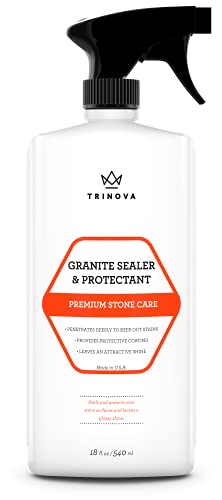


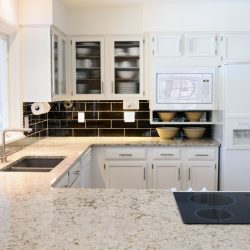
![An empty kitchen with a granite island countertop with wooden flooring, How To Clean Granite Countertops? [3 Steps]](https://kitchenseer.com/wp-content/uploads/2020/10/An-empty-kitchen-with-a-granite-island-countertop-with-wooden-flooring-250x250.jpg)
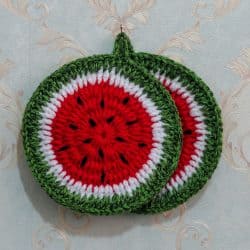
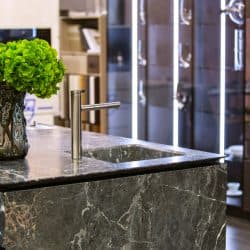
![Large furnished kitchen in new home with quartz counter tops, Do Quartz Countertops Stain? [And how to keep them clean]](https://kitchenseer.com/wp-content/uploads/2020/07/Large-furnished-kitchen-in-new-home-with-quartz-counter-tops-250x250.jpg)
